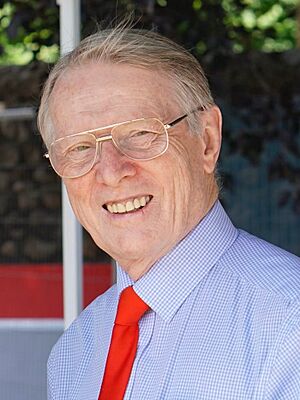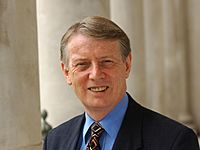Alun Michael facts for kids
Quick facts for kids
Alun Michael
|
|
|---|---|

Official portrait, 2020
|
|
| South Wales Police and Crime Commissioner | |
| In office 22 November 2012 – 8 May 2024 |
|
| Deputy | Sophie Howe Emma Wools |
| Preceded by | Office established |
| Succeeded by | Emma Wools |
| Minister of State for Industry and the Regions | |
| In office 10 May 2005 – 5 May 2006 |
|
| Prime Minister | Tony Blair |
| Preceded by | Jacqui Smith |
| Succeeded by | Ian McCartney |
| Minister of State for Rural Affairs | |
| In office 11 June 2001 – 10 May 2005 |
|
| Prime Minister | Tony Blair |
| Preceded by | Nick Raynsford |
| Succeeded by | Jim Knight |
| First Secretary of Wales | |
| In office 12 May 1999 – 9 February 2000 |
|
| Monarch | Elizabeth II |
| Preceded by | Office established |
| Succeeded by | Rhodri Morgan |
| Leader of Welsh Labour | |
| In office 29 October 1998 – 9 February 2000 |
|
| UK party leader | Tony Blair |
| Preceded by | Ron Davies |
| Succeeded by | Rhodri Morgan |
| Secretary of State for Wales | |
| In office 27 October 1998 – 28 July 1999 |
|
| Prime Minister | Tony Blair |
| Preceded by | Ron Davies |
| Succeeded by | Paul Murphy |
| Minister of State for Home Affairs | |
| In office 6 May 1997 – 27 October 1998 |
|
| Prime Minister | Tony Blair |
| Preceded by | David Maclean |
| Succeeded by | Paul Boateng |
| Member of the Welsh Assembly for Mid and West Wales |
|
| In office 6 May 1999 – 1 May 2000 |
|
| Preceded by | Constituency established |
| Succeeded by | Delyth Evans |
| Member of Parliament for Cardiff South and Penarth |
|
| In office 11 June 1987 – 22 October 2012 |
|
| Preceded by | James Callaghan |
| Succeeded by | Stephen Doughty |
| Personal details | |
| Born | 22 August 1943 Bryngwran, Anglesey, Wales |
| Political party | Welsh Labour (Labour and Co-operative) |
| Spouse | Mary Sophia Crawley |
| Children | 5 |
| Parents | Betty Michael Leslie Michael |
| Alma mater | Keele University |
| Cabinet | Michael government |
| Signature |  |
| Website | Official website: http://www.southwalescommissioner.org.uk |
Alun Edward Michael (born 22 August 1943) is a retired politician from Wales. He was a member of the Labour and Co-operative parties. He held important roles like Secretary of State for Wales from 1998 to 1999. He was also the very first First Secretary of Wales (a role now called First Minister) and the leader of Welsh Labour from 1999 to 2000. More recently, he served as the South Wales Police and Crime Commissioner from 2012 until May 2024.
Alun Michael was born on the island of Anglesey. He went to Colwyn Bay Grammar School and then to the University of Keele. He graduated in 1966 with a degree in Philosophy and English. Before becoming a politician, he worked as a reporter for the South Wales Echo newspaper until 1971. After that, he worked with young people and communities until 1987. He became a Justice of the Peace (a type of judge for minor cases) in 1972. He also served on the Cardiff City Council from 1973 to 1989.
In 1987, he was elected to the UK Parliament. He took over the seat for Cardiff South and Penarth from former Labour Prime Minister James Callaghan. When Labour won the election in 1997, he became a Minister of State for Home Affairs. In 1998, he became the Secretary of State for Wales. In 1999, he became the first First Secretary of Wales after the first elections for the National Assembly for Wales.
Alun Michael stepped down from his role as First Secretary in 2000. He then held various junior minister positions in the UK government. In 2012, he left Parliament to become the first Police and Crime Commissioner for South Wales. He was re-elected to this role in 2016 and 2021. He did not run for re-election in 2024, and his deputy, Emma Wools, took over the role on 8 May 2024.
Contents
Early Life and Education
Alun Michael was born in Bryngwran, Anglesey. His parents were Leslie and Betty Michael. He attended Colwyn Bay Grammar School. From 1962 to 1966, he studied at Keele University. He earned a Bachelor of Arts degree in Philosophy and English.
Career Before Politics
After university, Alun Michael worked as a reporter. He wrote for the South Wales Echo, an evening newspaper based in Cardiff. He worked alongside other journalists who later became famous, like Michael Buerk and Sue Lawley.
In 1971, he left journalism. For the next 16 years, until 1987, he worked as a youth and community worker. This involved helping young people and local communities. In 1972, he was appointed a Justice of the Peace. He even chaired the Cardiff Juvenile Bench, which deals with cases involving young people.
Political Journey
Alun Michael began his political career in local government. He was a member of the Cardiff City Council from 1973 to 1989. He represented the Rumney ward and later the Trowbridge ward.
In 1987, he became a Member of Parliament (MP). He won the seat for Cardiff South and Penarth. This seat had previously been held by former Prime Minister James Callaghan. Alun Michael kept this seat in several elections: 1992, 1997, 2001, 2005, and 2010.
Working in the Home Office
Before Labour won the 1997 general election, Alun Michael was a Shadow Home Affairs Minister. This meant he was part of the opposition party's team focusing on home affairs. After Labour's big win in 1997, he became a Minister of State in the Home Office. He was responsible for steering the Crime and Disorder Act 1998 through Parliament. This important law introduced Anti-social Behaviour Orders (ASBOs). It also created partnerships to help reduce crime.
He was also in charge of the government's policy for voluntary and community groups. He introduced a "compact" process to help the government work better with these groups. Later, from 2007 to 2010, he was a member of the Justice Select Committee. This committee looked into topics like how justice is handled and the role of prison officers.
Roles in Wales
In May 1997, Ron Davies became the Secretary of State for Wales. In 1998, Ron Davies resigned from this role. Tony Blair, the Prime Minister, then appointed Alun Michael to take his place.
Soon after, Ron Davies also resigned as the Labour leader in Wales. This meant there would be a new leader for Welsh Labour. Alun Michael was chosen to lead the party. In May 1999, the first elections for the National Assembly for Wales were held. Alun Michael became the first First Secretary of Wales on 12 May 1999. This position was later renamed First Minister of Wales.
 |
|
|
Premiership of Alun Michael
|
|
|---|---|
| 12 May 1999 – 9 February 2000 | |
| Premier | Alun Michael |
| Cabinet | Michael government |
| Party | Welsh Labour Party |
| Election | 1999 |
| Appointer | Elizabeth II |
| Seat | Tŷ Hywel |
|
• Rhodri Morgan →
|
|
Instead of forming a coalition government (where different parties work together), Alun Michael led a minority government. He believed this would encourage more teamwork in the Assembly. However, he resigned on 9 February 2000, after less than nine months in office. He wanted to avoid a "no confidence" vote related to funding from the European Union.
After this, Alun Michael continued to serve as an MP. He was on the Welsh Affairs Select Committee from 2007 to 2010. He resigned as an MP on 22 October 2012.
Environment and Business Roles
In 2001, Alun Michael became the Minister of State for Rural Affairs and Local Environmental Quality. This role was part of the DEFRA. He was closely involved with the law to ban hunting with dogs.
The Hunting Act
In 2004, he oversaw the creation of the Hunting Act 2004. This law banned hare coursing, beagling, fox hunting, mink hunting, and stag hunting in the UK from February 2005. Despite protests, he continued to visit rural areas. In 2004, he also officially approved the New Forest becoming a National Park.
In 2005, Alun Michael moved to a new ministerial role. He became the Minister of State for Industry and the Regions in the Department of Trade and Industry. He held this position for one year.
Views on Voting Age
In 2010, Alun Michael wrote in a newspaper column. He suggested lowering the voting age to 14. He believed that young people at this age are well-informed. He thought it would help everyone learn how to vote before leaving full-time education. This idea went further than his party's official policy at the time.
After Retirement
After retiring from Parliament, Alun Michael continued to be involved in public service. On 6 November 2024, he became a voluntary ambassador for the charity Action for Children. In March 2025, he became the president of the Council for Wales of Voluntary Youth Services.
Awards and Honours
Alun Michael has received several honours for his public service:
- In 1972, he was made a Justice of the Peace.
- In 2016, he was made an Officer of the Order of St John.
- In the 2025 New Year Honours, he was made an Officer of the Order of the British Empire (OBE). This award was for his services to public safety.
- He is also a Fellow of the Royal Society of Arts.
See also
- List of Welsh AMs/MSs with the shortest service

